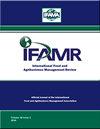Consumers’ attitude toward the source of biotechnology
IF 1.5
4区 经济学
Q3 AGRICULTURAL ECONOMICS & POLICY
International Food and Agribusiness Management Review
Pub Date : 2023-09-21
DOI:10.22434/ifamr2022.0103
引用次数: 0
Abstract
Existing research based on labels, risks and benefits, and cultural differences has focused on consumers’ preferences for genetically modified (GM) food products. Limited attention has been paid to the attitudes toward the source who developed the biotechnology. Because there may be trust issues associated with large multinational firms that are often involved in the development of biotechnology, it remains an unexplored question whether consumers consider who produces the technology when forming opinions about food produced with biotechnology. This study investigates consumers’ attitude toward the source of biotechnology using a choice experiment with GM oranges. The study involved participants from three major orange-consuming countries (United States, Germany, and Spain). Results reveal that participants from all three countries were less willing to pay for GM oranges when the technology originated from multinational agribusiness corporations, compared to public universities and small companies. Further examining the effect of consumers’ perceptions, we found consumers’ perception of corporate distrust and environmental concern negatively influence their attitude toward the source of biotechnology, but their technology acceptance positively affects the attitude. By understanding consumers’ attitudes about the source of biotechnology and factors that may improve the consumer reactions, communication and promotion of new biotechnology food products to improve acceptance from existing and potential consumers are discussed.消费者对生物技术来源的态度
现有的基于标签、风险和利益以及文化差异的研究主要集中在消费者对转基因食品的偏好上。人们对开发生物技术的源头的态度关注有限。由于经常参与生物技术开发的大型跨国公司可能存在信任问题,因此消费者在对生物技术生产的食品形成意见时,是否会考虑是谁生产了这项技术,这仍然是一个未研究的问题。本研究通过转基因橙子的选择实验来调查消费者对生物技术来源的态度。这项研究的参与者来自三个主要的橙子消费国(美国、德国和西班牙)。结果显示,与公立大学和小公司相比,当转基因橙子的技术来自跨国农业综合企业时,这三个国家的参与者更不愿意为转基因橙子付费。进一步考察消费者认知的影响,我们发现消费者对企业不信任和环境关注的认知负向影响他们对生物技术来源的态度,但他们的技术接受度正向影响态度。通过了解消费者对生物技术来源的态度和可能改善消费者反应的因素,讨论了新的生物技术食品的沟通和推广,以提高现有和潜在消费者的接受度。
本文章由计算机程序翻译,如有差异,请以英文原文为准。
求助全文
约1分钟内获得全文
求助全文
来源期刊

International Food and Agribusiness Management Review
AGRICULTURAL ECONOMICS & POLICY-
CiteScore
2.90
自引率
0.00%
发文量
0
审稿时长
>12 weeks
期刊介绍:
The IFAMR is an internationally recognized catalyst for discussion and inquiry on issues related to the global food and agribusiness system. The journal provides an intellectual meeting place for industry executives, managers, scholars and practitioners interested in the effective management of agribusiness firms and organizations.
IFAMR publishes high quality, peer reviewed, scholarly articles on topics related to the practice of management in the food and agribusiness industry. The Journal provides managers, researchers and teachers a forum where they can publish and acquire research results, new ideas, applications of new knowledge, and discussions of issues important to the worldwide food and agribusiness system. The Review is published electronically on this website.
The core values of the Review are as follows: excellent academic contributions; fast, thorough, and detailed peer reviews; building human capital through the development of good writing skills in scholars and students; broad international representation among authors, editors, and reviewers; a showcase for IFAMA’s unique industry-scholar relationship, and a facilitator of international debate, networking, and research in agribusiness.
The Review welcomes scholarly articles on business, public policy, law and education pertaining to the global food system. Articles may be applied or theoretical, but must relevant to managers or management scholars studies, industry interviews, and book reviews are also welcome.
 求助内容:
求助内容: 应助结果提醒方式:
应助结果提醒方式:


